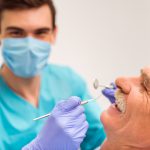
The development of commercial laboratory tests utilizing the collection of saliva is, in my opinion, an important step forward in understanding and managing inflammatory periodontal disease. There are, in fact, no tests available that will predict the onset of attachment loss. However, by gathering information on a patient’s genetic inflammatory profile as well as periodontal pathogen profile we have access to objective data when ascertaining risk, or the possible onset of periodontal disease ...
Read More









